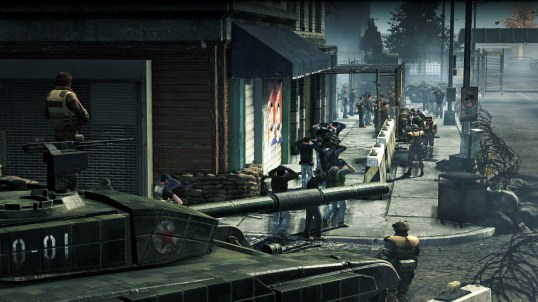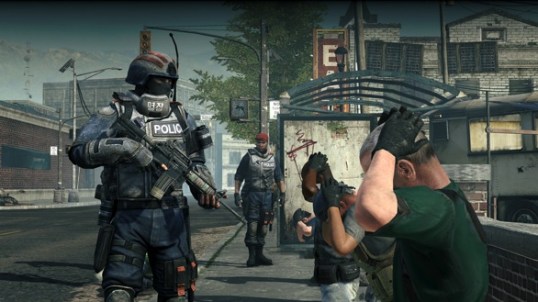War’s a staple setting a huge chunk of the hundreds of big-budget video games that come out every year. Last year’s best-selling games–Halo: Reach and Call of Duty: Black Ops–both took place in the midst of military actions.
But there’s one thing most war games fail to communicate and that’s the tragedy that results from all the shooting. Oh, you’ll almost always get the dramatic death of a character the developers want you to care about. But it’s rare that a game tries to channel the way that war affects a society.
For example, Killzone 3 ends with players essentially annihilating an entire planet. All you get before the credits roll is a few grim sentences, nothing that really grapples with the enormity of what just happened. It just seems like the juiciest part of the narrative just sits there unjuiced.
Lots of FPS combat games place players in foreign lands (or planets, even) where most everything seems exotic, foreign and, by design, hostile. Maybe the reason that tragedy and consequences remain elusive in war games is because publishers–and gamers, too–cast these games as escapist entertainment, with scant commentary on sociopolitical situations or human nature. So, part of what intrigues about Homefront is that the game starts in that conceptual space. (“Homefront” Isn’t Your Typical War Video Game)
As previously noted, Homefront posits that North Korea goes on a run of unchecked aggression in the near future, when America’s weakened economy leaves the U.S. unable to do anything about it. Ultimately, the Greater Korean Republic invades the States and you play as rebel pilot Robert Jacobs helping the Resistance repel the Korean People’s Army from the country. A video clip at the start of the game sets up the sociopolitical dominoes that lead to Korea running rampant over the globe and subsequent interstitial sequences show rebel radio stations efforts to counter the Korean occupiers’ propaganda. Homefront‘s by no means a primer on foreign policy but you will learn tidbits about the Juche philosophy that helped establish the North Korean dictatorship. The real-world-gone-wrong approach makes impactful in a way that, say, Halo may not be for other people. You may not be a former fighter pilot like Jacobs, the character you control during the game, but you’d still ask yourself what you’d do if your community came under siege.
From there, Homefront goes out of its way to be programmatically manipulative. Children’s drawings of “Mom Dad + Me” abound. The resistance cell you first hole up with has carved out Oasis, a survivalist idyll with solar panels, victory gardens and wind power. It’s even got pink flamingoes! Missions take you through labor camps, with intimations of wartime rape and a prisoner performing salat, praying in the Muslim way. (Sadly, you couldn’t talk to him.) You’ll even jump into a mass grave to hide from occupation patrols. (On the Brink: Hands-On with 2011’s Experimental Shooter)
That’s just the backdrop, though. Combat manipulates you in a different way. Many of the missions seem to be designed to make you feel underpowered and outmatched, only to eventually give you the tools to orchestrate an orgy of revenge on the KPA enemies who’ve been kicking your ass. Unfortunately, the shooting experience in Homefront doesn’t do much to distinguish itself for other similar games. There’s no sticky cover in the game, which is to say there’s no way to lean against an object and automatically peek in and out. While that makes it feel out of step with just about every other FPS out there, it feels more like a decision than a misstep. Having to stick your head out to shoot at KPA enemies feels more dangerous without the ability to peer around corners as in other games. But, too many other parts of the experience fall apart and those are unmistakably missteps. The enemy AI is stone-dumb, often standing out in the open to fire at you, which makes them sitting ducks, and staying stock still when grenades are thrown their way. The aiming often feels imprecise and the guns lack personality. Almost all of the rifles feel the same and too few weapons make you want to hold on to them. That’s important because if the character you control exists only as a cipher–as does Jacobs–then something in the gameplay needs to speak out to you. Guns and other weapons are characters in a first-person shooter. The sequences where you control Goliath–the semi-autonomous super-tank–shine, but they’re few and far in between. (The Long Goodbye: Halo: Reach Review)
On the narrative front, the characters mostly conform to type. Rebel leader Boone is compassionate and resolute, female soldier Rianna voices regret over the killing the resistance has to do amd Connor’s the hot-headed “America, F— Yeah” Rambo-style patriot. And, sometimes, the dialogue and voicework dips below that of b-movie material. As enemy soldiers burn in a fiery gunfight, Connor quips, “I thought I smelled Korean barbecue.” Rianna reacts with disgust but it’s entirely probable that more than a few players will laugh at that line. But, overall, you learn next to nothing about Jacobs and why he was holed up in a squat when the KPA came. THQ’s made a big deal about having John Milius–screenwriter of jingoistic ’80s action movies Red Dawn and Rambo–on board for plot duty, but there’s no surprise or pull to the proceedings.
If the technology were extant in 1942, the shooters that would’ve been made then would probably feel a lot like Homefront does now. It’s video game as propaganda, filled with righteous indignation and reassuring home truths about the American fighting spirit. Our enemies are ignoble and deserve to die. But the experience is about as substantial as a pamphlet, which isn’t helped by how short the single-player portion is. You want to learn more about the world but there’s not a lot of depth. Homefront starts off strong but the wonkiness of the gameplay and the predictability of the plot and characters never fires you up the way you want to. For a game that sets out to manipulate your emotions in its world-building, the lack of complexity is too big a weakness to overcome.
Official Techland Score: 7.5 out of 10



